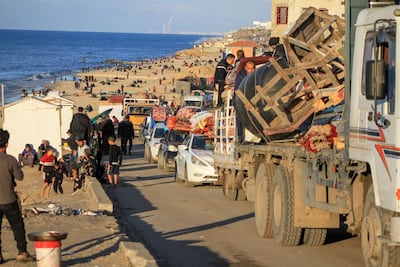The Biden administration's initial response to the Israel-Gaza war was to secure a paramount goal: to ensure that the conflict remains contained to Gaza. Washington feared being sucked into a vortex of regional chaos, the opposite of its broader Middle East policy of stability, security and regional integration. The Hamas-led attack in October on southern Israel threw that policy into disarray, but Washington assumed that if the conflict could be contained to Gaza, then stabilisation and even integration could be resurrected in 2024 and, especially, a potential second Biden term.
After the first month of fighting in which the chaos had not spread significantly, even to the occupied West Bank, and the regional response, especially by Iran's network of armed militias in the Arab world, led by Hezbollah, was limited to essentially symbolic responses, the administration concluded in relief that its policy had been a relative success. However, that has recently been called into serious question, not least by Israel, placing Mr Biden in an extremely uncomfortable position, facing a series of mounting crises without a clear sense of precisely how to restore relative regional calm instead of mounting alarm.

The unexpected factor is the rise of the Yemeni Houthi rebels as a major regional tool among Iran's "axis of resistance," with its brazen attacks on commercial shipping in the Red Sea. A full 12 per cent of global maritime commerce runs through the Red Sea and the Suez Canal, so Houthi attacks on commercial shipping around the Bab Al Mandab strait are spooking shipping and insurance companies, prompting several major shippers to prefer the more time-consuming and expensive route around the southern African Cape of Good Hope.
Some prominent shipping lines have begun, tentatively, to re-engage with the Red Sea, with trepidation and only because of a major show of force by the US Navy which has sunk several Houthi rapid-attack craft, killing their crews. It's unclear to what extent the Houthis are willing to continue to harass shipping despite growing warnings from a large coalition of international naval forces which doesn’t formally include any of the Red Sea littoral states, although many are likely unofficial participants.
The Red Sea crisis suggests that if the US is serious about confronting the Houthi threat to maritime security in the Red Sea, it may have to strike back directly at the Yemeni extremist group, effectively joining a war that has been unpopular in Washington because it has been broadly misconstrued as a Saudi adventure that was supposedly avoidable. If nothing else, that perspective has taken a severe battering in recent weeks, and hopefully will now be a welcome anachronism, no longer to be heard again in its most strident and ignorant forms in the halls of power in Washington.

This Houthi aggression is also a strong signal from Iran that its regional reach spreads far beyond the Gulf region into the Red Sea and all around the strategically-imperative Arabian Peninsula and that the Houthis are not just a Yemeni or Saudi problem but an international one and an urgent challenge to the rules-based Western-led international order.
This underscores that Iran views its ability to disrupt international shipping as a crucial aspect of its leverage with Western and regional powers, the message being that if Iran does not feel included in the Gulf and regional maritime security orders, there won't be one, and that if Tehran does not feel free to sell its oil – for example because of American or international sanctions – no one else will be free to buy or sell anything unharmed either.
But Iran is not the only headache for Washington. Israel is also emerging, despite the bear-hug of support from the Biden administration, as a major threat to the US goal of conflict containment. The lesser front is in the West Bank, where deadly Israeli raids in West Bank towns such as Jenin and others have left the relative calm there hanging by a thread.
Repeated entreaties by the Biden administration on Israel's largely Jewish supremacist cabinet, particularly ministers in charge of the West Bank like Finance Minister Bezalel Smotrich, have gone unheeded, and both the Israeli military and the radical and violent settler allies of these extremist politicians have been conducting themselves with reckless and indefensible brutality against Palestinians in the West Bank, who have been relatively quiet despite the provocation of Israel's appalling war of vengeance in Gaza.
Worse, even though both Hezbollah and Iran have made it clear in both word and deed that neither wants this war to spread to Lebanon, that's apparently not the view of a growing faction within the Israeli war cabinet. From the outset, Defence Minister Yoav Gallant urged a "pre-emptive" attack against Hezbollah since it is Israel's most potent immediate antagonist, with a mighty arsenal of over 150,000 rockets and missiles, often with precision guidance, which can hit any target in Israel to devastating effect. Indeed, Israeli intelligence reportedly concluded that if Hezbollah had fully joined the Hamas-led attack on October 7, this massive arsenal could have resulted in 100,000 or more Israeli deaths in the first few days.
On the basis of wanting to pre-empt this arsenal and reduce potential Israeli losses to a more manageable level, these Israeli leaders, have been gaining ground in recent weeks and may well have the upper hand. The Biden administration was crucial in restraining them around October 11, when the initial "pre-emptive" strike was proposed.
Now the Israeli extremists have been demanding that Hezbollah soon withdraw its forces from southern Lebanon, as far north as the Litani River, consistent with their interpretation of UN Security Council resolution 1701 adopted after the last major Hezbollah-Israeli war in 2006. It's a reasonable interpretation of that resolution, but Israel is the last country that, with a straight face, can cite UN Security Council resolutions as inviolable and sacrosanct, given the veritable mountain of them that are routinely disregarded by Israel in the occupied Palestinian territories and elsewhere.
The Israeli assassination last week in Beirut of key Hamas leader Saleh Al Arouri who, unlike the other politburo figures living in the Qatari capital of Doha, was a pivotal figure in the status of Hamas's paramilitary wing, which he helped found, was a major escalation. He was the key liaison with Turkey, where he often lived, but more importantly, through Beirut which he also frequented, with Hezbollah and Iran. He is reported to have been present at the key meetings last summer in which Hamas believed it had received Hezbollah's pledges of support for a military action against Israel, which the Lebanese group clearly believes were vague enough to have committed themselves to nothing regarding the October 7 attack that they plausibly insist they were not informed about in advance.
Israel was very careful not to kill any Hezbollah members or Lebanese Shiites in its drone attack in Beirut, but only Hamas and Lebanese Muslim Brotherhood members, giving Hezbollah leader Hassan Nasrallah ample wiggle room regarding the need for a dramatic response. To date, Hezbollah rocket attacks aimed at an Israeli radar station in an uninhabited area of northern Israel confirm the strong implications of Mr Nasrallah's most recent speech in which he said his response would be "on the battlefield" and pursuant to "liberating every inch of Lebanese soil," referring to some villages Lebanon regards as still occupied by Israel.
Despite Hezbollah’s continued refusal to get drawn into the conflict, Israel's extremist faction appears determined to force Hezbollah to back down and withdraw its forces – under the rubric that the 80,000 Israelis who have been evacuated from northern Israel must be allowed to return to their homes "in peace and security”, a demand that did not exist when they initially proposed an attack against the Lebanese group in early October. Moreover Israel responded forcefully to an essentially symbolic Hezbollah retaliation, killing Wissam Al Tawil, the deputy commander of Hezbollah's elite border-area Radwan force. Israel has also repeatedly launched deadly attacks against the Lebanese army, including with white phosphorus chemical weapons.
This not only places Hezbollah in a difficult situation, it makes life exceedingly difficult for the Biden administration, because now its primary ally, Israel, is the driving force in promoting the contingency the US was most committed to avoiding: the spread of the war to include Hezbollah.
So, the Biden administration now has to not only deal with the sudden emergence of the Houthi threat to maritime security in the Red Sea, but also the Israeli threat to deliberately expand the war to Lebanon, possibly initiating a cascading series of attacks that could lead to a military confrontation between Washington and Tehran and, some Israelis possibly hope, the ultimate realisation of the long-sought after dream of an American attack against Iranian nuclear facilities.
The Biden administration, now squeezed between allies and adversaries, is in the trickiest situation it has faced since the first weeks following October 7. It is a crucial test of Mr Biden's diplomacy, strategy and will, in dealing firmly and effectively with both friend and foe alike.
Follow the latest on the Israel-Gaza war


